#CarListings
Explore tagged Tumblr posts
Text
Uniforms of the The First Carlist War
The First Carlist War broke out after the death of King Ferdinand VII, the king restored at the end of the Peninsular War thanks to Wellington's victory. The crown was claimed by both his daughter Isabella, backed by the Liberal party and his brother Don Carlos, at the head of northern ultra-conservatives centred in the Basque provinces and Navarre. The Liberals or 'Cristinos' were supported by a 10,000-strong British Legion of volunteers led by a former aide to Wellington as well as the British Royal Navy, a Portuguese division, and the French Foreign Legion. With both armies still using Napoleonic weapons and tactics, early victories were won by the Basque general Zumalacarregui. After his death in 1835 a see-saw series of campaigns followed, fought by conventional armies of horse, foot and guns, supported by many irregulars and guerrillas.
From "Armies of the First Carlist War 1833–39"
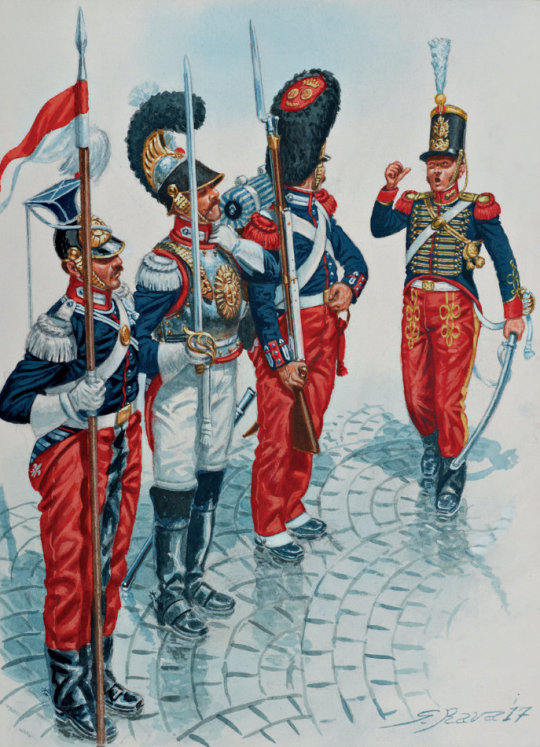
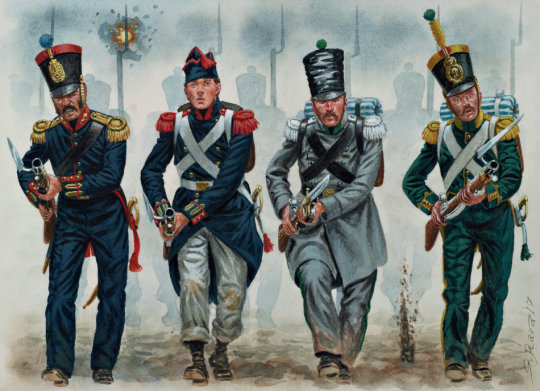
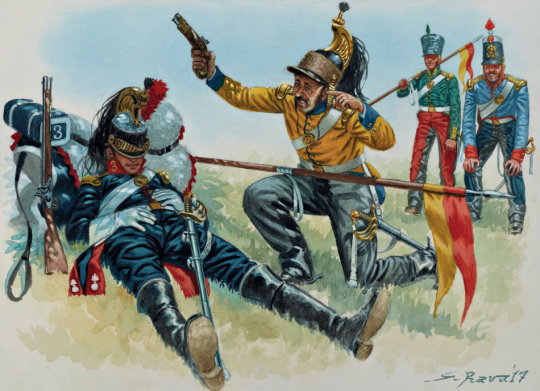
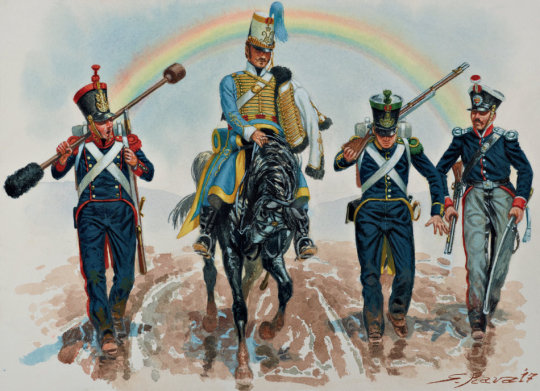
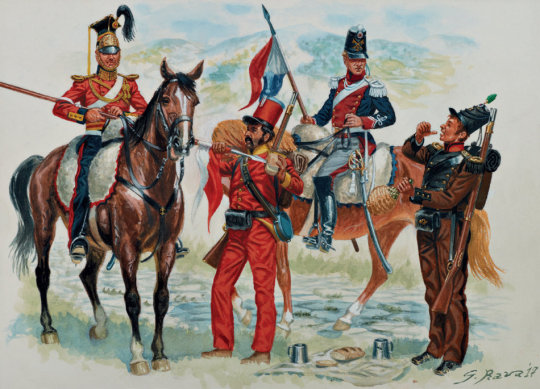
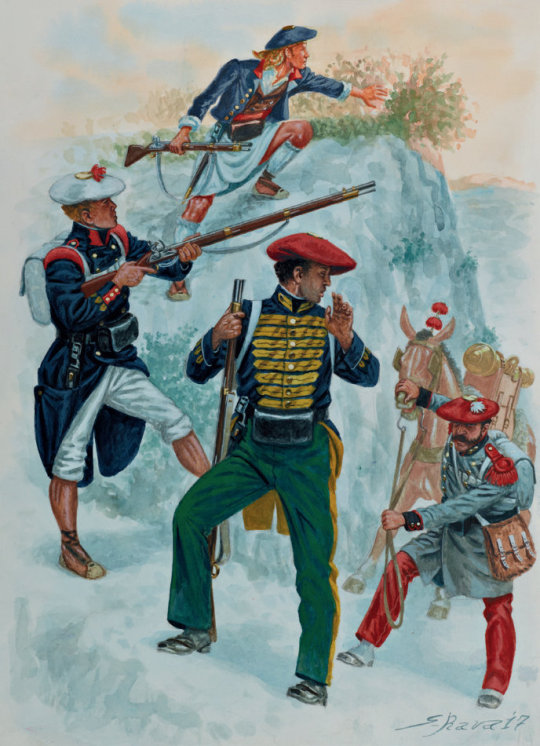
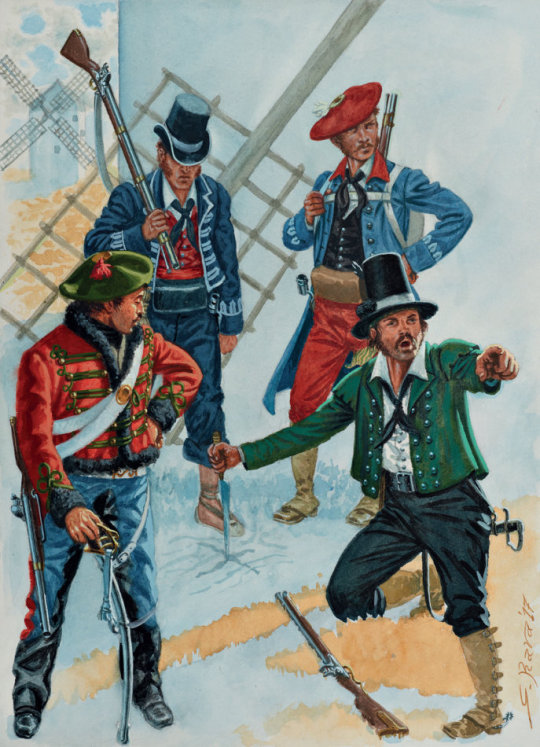
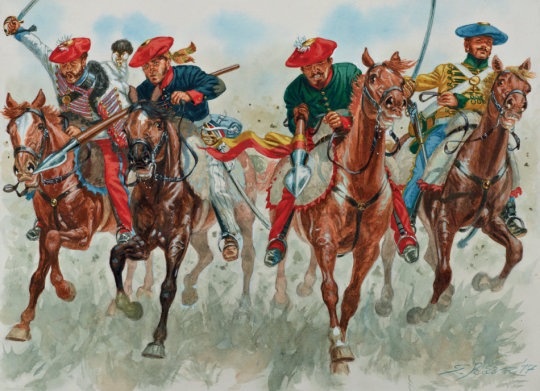
#1800s#military#military art#history#soldier#cavalry#spanish monarchy#spanish history#first carlist war#carlist war#Spanish Uniforms#Spanish Military#OG Spanish Civil War
18 notes
·
View notes
Text

Motorx is the ultimate Car Dealer & Listing WordPress theme designed specifically for car dealerships, auto listings, and vehicle marketplace websites. Featuring a sleek and modern design, Motorx allows you to showcase your cars and services in a professional and attractive way. With its powerful features, such as advanced search filters, vehicle details pages, and customizable layouts, you can easily create an online platform that highlights your inventory and engages potential customers. Whether you're running a single dealership or a large marketplace, Motorx provides everything you need to create a seamless and user-friendly experience. With Motorx, you can easily manage listings, showcase your vehicles, and provide an exceptional browsing experience that will set you apart from the competition.
👉 Download Now:
#Motorx #CarDealerTheme #CarListingTheme #AutomotiveWebsite #WordPressTheme #SEOOptimized #WooCommerce #WebDesign
2 notes
·
View notes
Text
six sentence sunday
She caught General Rieekan by himself at his desk after lunch. Leia sat in a chair opposite his without a word of greeting and stared at him, barely-contained rage simmering below her cool demeanor. Carlist glanced up at her from his datapad and smiled, chuckling to himself and shaking his head.
“Not a drop of Queen Breha’s blood in your veins, but you’ve got her death glare down,” he said fondly.
Leia set her jaw, irritated by the man’s obvious amusement. She wasn’t going to say a word until he said something worthwhile to respond to, and attempting to diminish her irritation with memories of her mother didn’t count.
#six sentence sunday#star wars fanfiction#star wars fanfic#leia organa#carlist rieekan#purpose of heritage excerpt#fic wip#fanfiction#my fic
6 notes
·
View notes
Text
Jorge's dad fell in the Carlist wars when Jorge was eight. Since then, the relationship between Jorge and his mother has become strained, with the then young boy blaming his mum for not having done something to stop him from going—not that she could have. When she sent Jorge to live with his cousin in England, he felt rejected all the more.
Therefore, when Professor Fig becomes his tutor, Jorge quickly latches onto him and they develop a strong mentor & mentee bond with a parental touch.
#hogwarts legacy#harry potter#oc#Jorge Alonso Cuélebre#During the Carlist wars Isabellan Spain and Britain were allied so I suppose it makes sense for some of Jorge's family to be in Britain#Gotta get my Spaniard into Hogwarts territory somehow#And since Spain was in deep crisis it makes sense for an affluent family to send their child somewhere safe
0 notes
Text
The Cotoner Family Aesthetic.
༶•┈┈⛧┈♛༶•┈┈⛧┈♛༶•
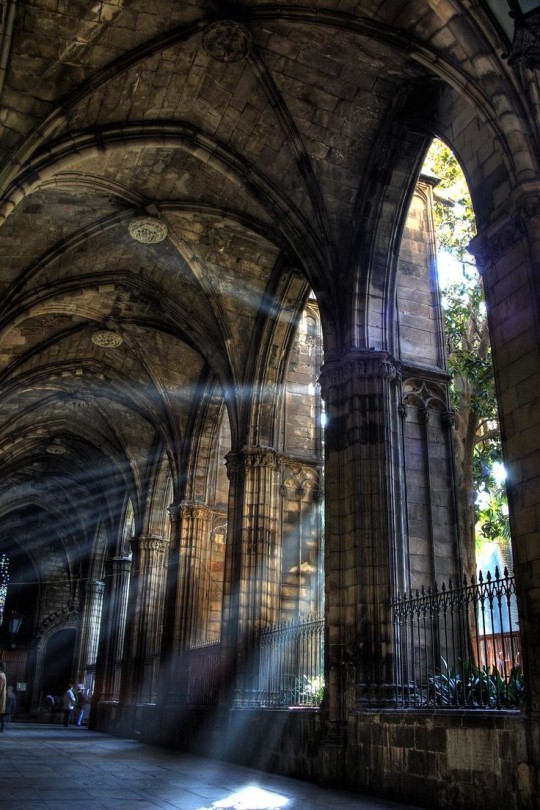
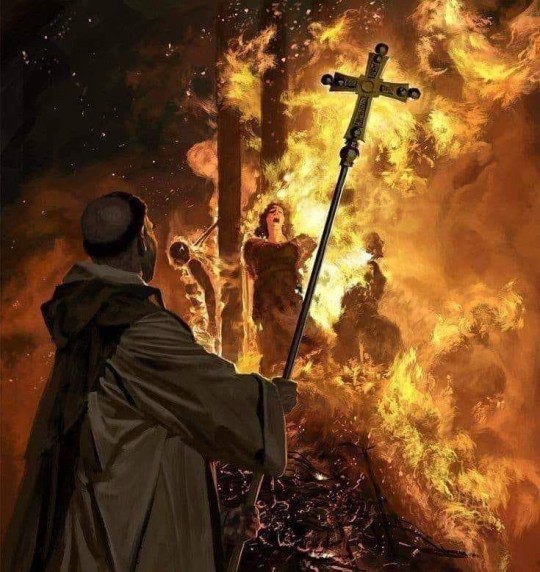
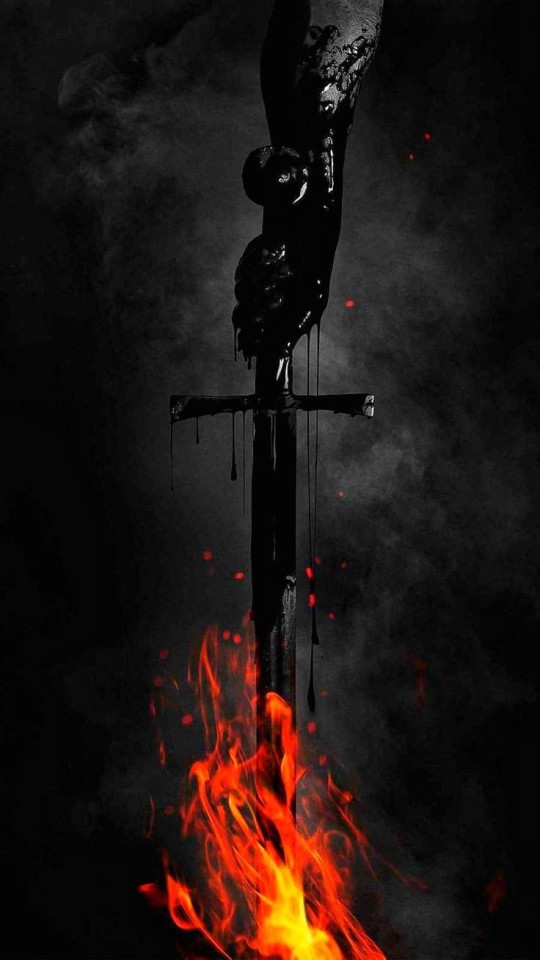
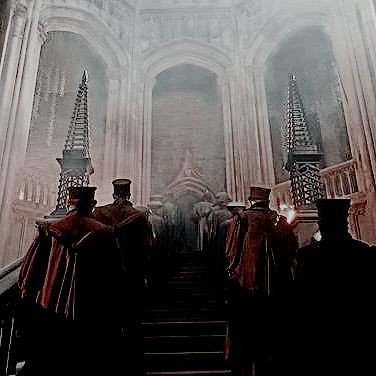

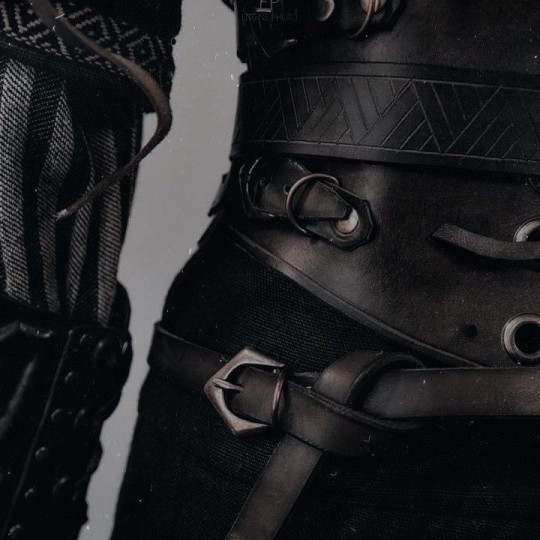


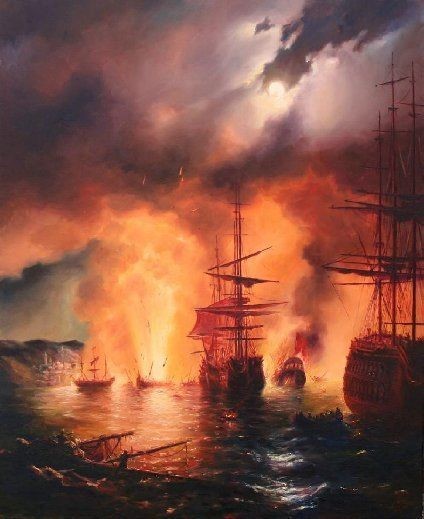
༶•┈┈⛧┈♛༶•┈┈⛧┈♛༶•
Aquellos que buscan el control para una utopía en medio del caos, manteniendo el poder en sus manos para guiar a las pobres ovejas.
Una familia, un legado transmitido de generación en generación. Los que están en la cima están destinados a brindar satisfacción, sin importar el costo.
.
Hombres y mujeres que llevaron esta Cruz con orgullo, con mentes agudas y voluntades inquebrantables. Fue gracias a ellos que la Orden llegó hasta donde está, y aún con tantos... Obstáculos, resurgieron de los pedazos rotos dejados por estos anarquistas. Somos la cara de esta victoria, somos la prueba de que nunca podrán detener nuestro poder ni nuestra verdad. Lucharemos hasta que caiga el último de nosotros.
༶•┈┈⛧┈♛༶•┈┈⛧┈♛༶•
The House of Cotoner is a Spanish Noble House known for it's services towards the crown and army until the XX Century. Two of it's branches, however, are composed by Templars and their allies.
.
Hailing from Siena, in Tuscany, the family was of good wealth and held status of Lordship, having moved from Italy to the Kingdom of Marjoca in the 14th Century. It is speculated the branch of the family that stayed in Tuscany becamed part of the Tuscan Rite.
.
Bernardo Cotoner was the first ever registrated member of the Family in Spain, and while his role within the Order were not reported, surviving letters reveal he made plenty of donations to the Order, along with having in his inner circle, many noticable Master Templars of the time.
.
His son, Nicolas Cotoner y Genovard would continue his father's steps, assuring the Family's closiness to the Order at each generation. It is known Nicolas Cotoner had three sons, one of which would achieve a great high-rank within the military of the Kingdom of Marjoca. From then on, it was clear the Family had bigger plans for themselves.
.
It was Nicolas' Great-Grandson, Antonio Cotoner y Vallobar who would rise the family's status. His bloodline, now having been part of the Rite for at least 3 generations, made his life philosophy be the Tenets of the Order. He was a brilliant man with grand ideas, well-read and ruthless, he quickly climbed the social leader, and was appointed Ambassador of Marjoca by Phillip II. With this influence, he would become one of the trusted man of the Spanish Grandmaster Alonso de Santiago.
.
He would go to have four children. Three of which would continue their devotion to the Spanish Rite. His youngest son, Bernardo Luis Cotoner y Ballester would become an Inquisitor appointed of the Kingom of Sardina, and General Inquisitor of the Kingdoms of Marjoca, Aragon, Valencia and the County of Barcelona. A Master Templar, acting under the instructions of the Grandmaster up until his death by the hands of the Assassins in Sicily.
His older son, Marc Antoní Cotoner y de Santmartí, would marry a fellow Templar, Señorita Teresa Augusta de Oleza, giving birth to Rafael Cotoner y Oleza and his brother, Nícolas Cotoner y Oleza, to whom both would rise as Grandmasters of the Order of Malta, an affiliated organization allied with the Order.
.
Both would go to have children and descendents, to who the noble Templar Marcos Antonio Cotoner y Sureda , Nícola's grandson would be mentioned. After the increase expand of the Assassins Influences across Spain, he was the one responsable for killing all Assassins that were active in Palma de Mallorca, making the Brotherhood temporarely retreat from the Balearic Islands.
.
Another one of Antonio's children was Marta Alejandra Cotoner y Santmartí, Marc's younger twin sister. She was not a famous Templar Master, but she was reported to work her influences and charms on the Court, particularly the favour of King Phillip II and his wife, Elizabeth of Valois. It was speculated she had many affairs within the Court, and many of her surviving letters indicate she took the role of an informant. She is credited as one of the responsables to uncover the allies of the Assassins, many of which were condemned to death. Most of her descendents, nowdays, refuse to part-take in anything related to the Order or the Brotherhood, the most noticable one is Fernando Cotoner y Chacón, Lieutenent at the Carlist Wars. While taking part of the conflict in the Moderate Party, he still had many of the Rites Principles within him, seeing by his refusal to assist the Assassins. It is believed this comes from his Grandfather, another Cotoner from the Templar Branch.
.
They have been involved since the begining: The Inquisition, the Patronship of the many Conquistadors, such as Francisco Pizarro, Diego Columbus, and many other Templar Allies. The "Purge " orchastrated by The Assassin's Mentor across Spain, almost whipping off all their influence. The conflicts with The Ottoman Empire and the Ottoman Brotherhood in the mid 17th Century. The search for the Tizona, the Sword wield by El Cid and believed to be a Piece of Eden, in the 18th Century... And the Carlists Wars, their most recent plan. Reach the control of the crown, bring Don Carlos to the throne, and wipe off Isabella, seeing how the Queen and her mother sympathized with the Assassins and their cause.
.
However they were ruined by those bastard traitors. The off-spring of that wench who married the Assassin. The Morisco.
.
Yet still, their legacy continues, with the current Head of the Family Branch being Master Esteban Felipe Cotoner y Camões, Marquess of Villamayor, and his children. And they will make sure that nothing stands in their way, even in another Kingdom...
༶•┈┈⛧┈♛༶•┈┈⛧┈♛༶•
#assassin's creed#assassin's creed: syndicate#assassin's creed oc#assassin's creed syndicate oc#OC Lore#OC Family#Spanish Rite of the Templar Order#Templar Order#Cotoner Family#AC Cotoner Family#Cotoner Family of Templars#(Most of the people here are real btw)#(But I'm trying to fit them in each ideology and all)#Sol's Family#Spanish Inquisition#Carlists Wars#Sol's Ancestors#My Aesthetic#Assassin's Creed Sanctity#Aiza_Luna_OCs#My OCs#OC: Teresa Augusta de Oleza#OC:Marta Alejandra Cotoner y Santmartí#OC: Marquess Esteban Felipe Cotoner y Camões#Master Templars#Templar OCs
1 note
·
View note
Text

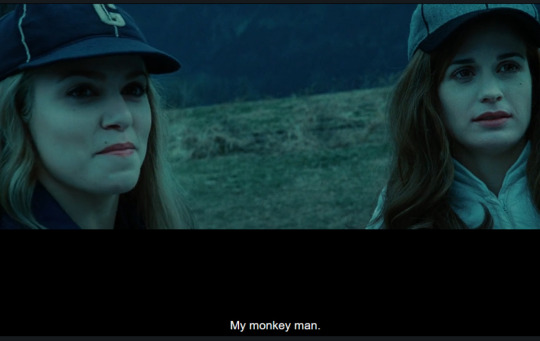
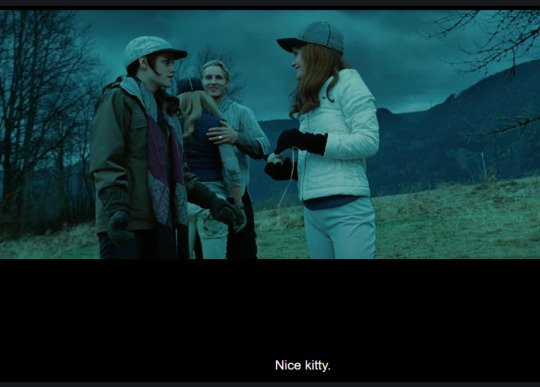
#what’s wrong with them 💕#Edward first sweet nickname for Bella (not counting Bella as one cause everybody calls her that)#is spider monkey….#and then carliste calls Rosalie kitty….#and Rosalie calls emmets her monkey man… hello#Twilight
1 note
·
View note
Text
The same channel has a video on the history of LGBT people and these images are so cute and funny


(this guy is talking WAY too fast for this to be good listening practice considering how bad my Spanish is, but oh well lol)
youtube
This is great. It's in Spanish with English subtitles. History told with little bits of paper, almost like animation but not quite.
One of the things that frustrates me is how many people doing the Camino de Santiago do not realize that its invention was both religious and political: Spain was trying to kick out the Muslims, and announcing that they had the bones of an Apostle in a city nearish the northwest coastline meant droves of Christians walking across northern Spain, which meant Christianity as a whole had a vested interest in protecting it from Muslim rule.

The guy making this uses the modern signage (yellow arrows, often on blue backgrounds), which is cute
I could quibble on how the cathedral didn't look like that for good while longer (it was built multiple times and then built onto several more) but that's not important to the point he's making lol

HAH. Truth.
Also, I did not know this, but enough Galicians emigrated to Argentina that the Argentinian word for all Spanish people was Gallegos (which is another word for Galician).
#sappho#I also watched his video on the history of the Basque region which was good#also I've realized I'm in this weird spot now#where I know vastly more about the history of Spain than like 95% of americans#but I know far less than your average Spanish ten-year-old most likely lol#so like my understanding of Spanish history is like: uhhh Roman rule then uhhhhh something something Muslims in the 700's#then uhhhhh lots of wars and the Camino and then the Muslims were out in 1492#then uhhhhh at some point a few centuries later France got all up in their business (actually I think that happened multiple times)#and then uhhh the Carlist wars??? and then the civil war that lead to Franco (who was a dictator)#(and also the Catholic Church was REAL CHUMMY with him)#and then in 1978 they got a democracy The End#also yes they still have a monarchy but it's a constitutional monarchy like a lot of Europe has#spain#bc of the tags lol
6 notes
·
View notes
Text
The Soviet Revolution of October 1934
The Second Spanish Republic is a figure in history which tends to be overly glorified by the contemporary Spanish left, including some excessively folklorist communists, as a desire to look through history for any instance when opposition to the monarchy and reactionaries was the hegemonic position. After 40 years of a fascist dictatorship, and 46 years of a liberal democracy that has exposed social-democracy's bankruptcy, the Second Republic is a time when the PCE (Communist Party of Spain) was a force to be reckoned with, at least compared to today, with a few hundred thousands along its lines. Despite the Second Republic lasting from 1931 to 1936, the aspects that tend to be glorified are the times of the Popular Front, the electoral alliance from the PSOE to the PCE that won the February 1936 elections, and ruled until the coup d'etat of July 1936. Perhaps unconsciously, perhaps consciously, the years of 1932-1935 tend to be not forgotten, but minimized.
This is because the Second Republic was not a "popular" state, it wasn't even nominally progressive for half its history. And again, in an exercise of willful ignorance, when its repressive episodes are discussed, most tend to focus on the Black Biennium, as historiography knows it, the two years (1933-1935) when the right governed under the CEDA coalition, which included falangists, monarchists, even Carlists. But the history of repression in the Second Republic begins not even a month after its constitution was ratified. The Castiblanco incidents of December 1931 saw a few day workers killed by the police during a peaceful demonstration asking for work, afterwards it turned violent and 4 policemen were lynched by the workers. That same week, in the Arnedo incidents, the 5th of January 1932, the police shot into a crowd of striking workers in the town's square, renamed recently to Republic Square. 11 people were killed, two of them a mother and his 4 year old son, another a 70 year old woman. 5 others were permanently left unable to work. Just a year later, in January of 1933, 19 men, 2 women and a child were massacred in the Casas Viejas Incident, after an attempted uprising and occupation of the police quarters.
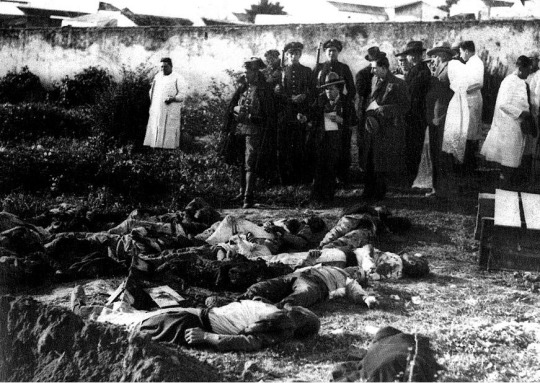
The Second Republic was always an anti-worker state, from its very beginnings. Regardless of what its constitution said, the social advances of the republic were lubricated with worker's blood.
Let's set some context for the subject of this post: The PCE, section of the Third International, found itself at risk of dissappearence at the end of the 1923-1930 dictatorship. It only really began to recover after José Diaz was elected General Secretary in 1932, it had about 1.000 members at this time, and by 1934 it had risen to 15.000 members, without counting the members of its youth wing. Internationally, the meteoric rise of fascism was unignorable. Nazi-fascism and fascism had seized power in Germany and Italy, and similar tendencies in Portugal and Austria were also in power, in the form of Salazar's Estado Novo in the former and Dollfuß' austrofascism in the latter, himself killed by outright nazi-fascists. Spain had its supposedly progressive Republic, of course, but it did not prevent the JONS to be founded in 1931 and the Falange in 1932, which during the civil war would merge into the infamous FE de las JONS, the Spanish Falange of the National-Syndicalist Offensive Juntas (The Falange is still a legal party now!). The leader of the CEDA, which would later govern during that Black Biennium I mentioned earlier, attended the Nürnberg Congess of 1932, where the pictures of those massive nazi-fascist rallies come from.
The 4th of October, 1934, 3 CEDA ministers had been chosen to enter the government, and in response, a strike, called the Revolutionary General Strike, was called for the following day, the 5th of October, 90 years ago today. The organization of this strike was done between the PCE, CNT (national confederation of workers, an anarcho-syndicalist union) and PSOE. The will to call the strike was not equal, however. The meeting minutes of the evening and night of the 4th show that the CNT was not very convinced of the strike and flip-flopped a lot, while the PSOE only decided to support the strike once it became impossible for them not to. The PCE, on the other hand, had already spent a few months warning of this, and preparing.
Barely a month before October, the police found a shipment of weapons going from the port of Gijón to Mieres, the future epicenter of the revolution. There were three armed shipments, and while the other two reached their destination, the third one being found almost lead to Indalecio Prieto, of the PSOE, being arrested. As a result, the weapon stashes in various places in Madrid (Casa del Pueblo, Ciudad Universitaria, Cuatro Caminos). These weapon stashes were supposed to supply the revolutionary strike in Madrid, and since they were found, the nascent revolutionary center was stillborn, since it was unable to arm itself. These same weapon stashes would later be replenished and used by the first militias of Madrid in the July 1936 coup d'etat
Nevertheless, the call for a strike was distributed at 6:00 of the 5th, but it was only heeded in Asturias, Madrid, Vizcaya, Cataluña, plus a few weak points (Cantabria, Aragón, Alicante, León, Palencia, Málaga). The reason the call was not heeded in broader parts of the country was because the agricultural day workers, predominant throughout the central meseta and south had already carried out their own strike that same year. They were recovering, they feared the repression that was still fresh in their minds, and it did not help that the predominant political organization among them, the CNT, took too long to support the strike, they simply were not prepared. It is impossible to understate how crucial this point is. The greatest worker strata in Spain were unable to be reached by the call to a revolutionary strike, for reasons related to the situation, but because of the inability of the PCE of this time to truly penetrate the social majority.
At any rate, the Revolutionary General Strike was not ignored everywhere, from these days comes this picture of Madrid's very center devoid of people, withholding their work, but impotent to do anything more:
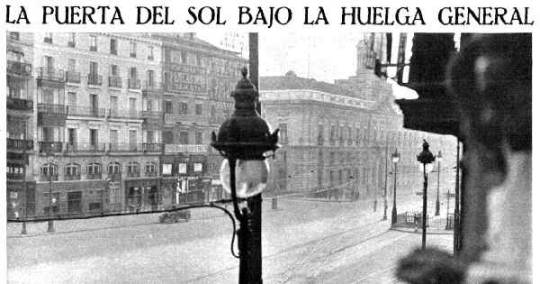
The Second Republic did not hesitate to stifle this strike, using planes and naval and land artillery. Once again, Spanish capital required trails of this country's reddest blood to line the streets, not shying away from employing the help of fascists such as the up-and-coming General Franco, sent to repress the workers of Asturias, where the strike was incandescent with revolutionary impetus. Before talking about Asturias, I won't ignore the other places where the strike was also popular. In Guipúzcoa and Vizcaya, The Basque Country, repression was just as bloody, executed by the Guardias de Asalto (Assault Guards), killing 40 workers in Vizcaya. There, the "Revolutionary Committee of Vizcaya", led by the UGT, was quickly dissolved. In Cataluña, a Catalan state was quickly declared, lead by the bourgeois Esquerra Republicana de Catalunya (Catalonian Republican Left), but was just as quickly put down with another 40 dead.
Asturias is another story, one that lasted for two weeks. It isn't much, but in those two weeks, the Spanish proletariat came the closest to holding political power, closer than any other time in its history. There, the strike did have a pre-existing entity capable of organizing the strike: the Worker and Peasant Alliance formed the 1st of April of that year, an armed force influenced by UGT, CNT (only present in the Asturias alliance), the Asturian Socialist Federation, and the PCE, whose militants often represented the most advanced elements of these alliances, but simultaneously relatively few. These alliances were heavily inspired by the Soviets, and often talked about the Sovietization of industry and of opposing colonialism. While this is evidence that it really was an attempted revolution, and that they were inspired by the Bolshevik revolution, their attempt to imitate the USSR's Soviets instead of learning from them was one of the many factors that provoked its defeat. Despite the name, the Worker and Peasant alliances were never as strong among peasants, not a lot of effort was put into it.
Another organization that was relevant during the October Revolutionary Strike were the Workers and Peasant's Antifascist Militias (MAOC in Spanish), a paramilitary militia, founded by Antonio Modesto, a member of the PCE educated in the USSR, he'd later become famous within the republican side of the Civil war. These militias were few but competent, they counted 150 members in Madrid and Asturias each, and while the Asturias militias participated in the revolution, the ones in Madrid sabotaged the roads and railways leading north, to avoid reinforcements getting to Asturias. These militias would later be the base from which the Fifth Regiment was created, in July 1936, to commence the defense of Madrid from the coup d'etat and fascist assault.
In Asturias itself, the proletariat lunged forwards as fast as it could, growing from the town of Mieres and the Nalón basin, to every other mining basin, taking the cities of Oviedo and Gijón by force. The National Guard's many stations were occupied and raided for arms and ammunition, they already had access to explosives from mining equipment. At one point, they felt strong enough to consider a march on Madrid, and even proclaimed the Asturian Socialist Republic. In what sometimes was called the Asturian Commune, a reference to the Paris Commune of 1871, production was controlled by workers, protected by a combatant force of up to 30.000 strong. Production in the metallurgical and mining industry was organized through attempts at imitation of the Soviets, as I mentioned. The Asturias branch of the Central Bank of Spain was expropriated as well, substituting money for a system based on coupon-like vouchers. However, the Revolutionary Committee leading the revolution was dissolved and reformed 2 times in those weeks, without counting the third dissolution that came with capitulation, although that committee did begin to plan the region's economy, the short span of time not really being enough to judge its efficiency.
The revolutionaries' retreat only began once the Republican government, as anti-worker as ever, followed the advice of generals Franco and Godet to deploy the Tercios de Regulares and the African Legion, two battle-hardened groups of the military not afraid to be brutal against the workers. While they advanced, for instance, they executed every wounded solider or civilian found in captured hospitals. In Asturias, more than a thousand workers were killed in combat or executed, and in total throughout Spain, the strike concluded with 2.000 dead, 7.000 wounded, and 40.000 imprisoned, for the crime and sin of daring to govern oneself and to end the exploitation of man by man. One of these dead workers stands out among the rest in popular culture nowadays, a member of the PCE's youth wing: Aida de la Fuente. She was only 19 when she joined the revolution in motion, the daughter of the PCE's founder in Oviedo, and she was known to be an exceptionally brave and dedicated communist. The 13th of October, a few hours after being seen distributing leaflets to civilians urging them to join the revolution, she found herself almost alone in Oviedo, trying to hold off the Legion's advance by manning a machine gun, and she managed to do so for a few hours. She was reached nevertheless and when a Legion commander asked her to surrender, she only responded by shooting back. Seconds later she was killed, and later found in a common grave. The counter-revolutionary press attempted to paint her murder as one committed by her own comrades, even claiming rape, but this was disproved by a journalist who risked his own life, and the testimony of the very legionary who executed Asturias' reddest rose.

The Asturias revolution was, for all its merits and promise, a stillborn revolution. The Communist Party did not have effective direction over the mass of proletarians involved in the revolution, let alone the even greater mass who, for one reason or another, did not meet the conditions necessary for attempting to seize power. The strike's organization was insufficient and thwarted in part, and militarily, the objective Indalecio Prieto was tasked with of securing support among the military officials, along with the general inferiority of the Asturian revolutionaries compared with the elite bodies of the military, meant there was no realistic chance of success. The strike was not even fully effective within Asturias, for instance, the livestock peasants known as vaqueiros, of the southwest, did not ever really have their influence. The PSOE militants who did exist in the region got into trucks and left for Oviedo, while a column of revolutionaries from León, the other side of the mountain range, tried to take Cangas del Narcea, the main town of the region, but they were routed by the National Guard.
After the defeat, 121 revolutionaries exiled themselves to the USSR, mostly communists but also accompanied by a handful of anarchists. There, they received education as cadres, who later returned to Spain before and during the civil war, providing invaluable expertise. Others chose to exile in Portugal or France, but both those countries repatriated them to be imprisoned in Spain.
During the negotiations between the Popular Front and the PCE for the 1936 elections, the main requisite they demanded in order to join was the amnisty of these tens of thousands of imprisoned workers, from the October Revolution and from the myriad of episodes of repression during the Black Biennium. To achieve this amnisty, they were also helped by International Red Aid, a political Red Cross founded by the International in 1922. They, along with the PCE, also provided a pension for the families of the many imprisoned. During the civil war, the Red Aid played an important role in the republican side's medical centers.
This episode is often forgotten when talking about the civil war, but it was one of the many reasons fascists were allowed to take power. Spain's risk of sovietization was an internationally recognized risk, so when the opportunity came, Spanish, English, French, and US capital very gladly did everything they could to hamper the Republic
The lesson from the October Revolution of 1934 is clear. Without country-wide preparation, without a proper analysis of your own conditions, and without achieving social alliances, any revolutionary struggle is bound to fail. The lack of support in the much greater agricultural areas, the rushed planning and failed planning everywhere but Asturias, partially, the PCE's still weak influence in most organizations or regions, all of this meant that, whatever the Spanish proletariat learnt in that Revolutionary General Strike, was bound to be written in sweat and blood. The point of commemorating this bittersweet memory is not to dwell on what could have been, nor to recreate the MAOCs. It's to remember that a revolution is always a couple of bad decades away, and that not building consciousness and preparing structures for it will only mean more unnecessarily murdered workers. It's to ensure that, next time red October is around the corner, it will not be premature. The strength of the working class, our class, the social majority, lies not in the number of victories and defeats, but in the very fact of our fight, explicit and implicit. It lies in the fact that, for as long as classes based on exploitation exist, class conflict is unavoidable.
Many political forces nowadays, which one might call opportunist, will try to draw parallels between that autumn of 1934 and today, exhorting "unity of the left". The only unity that's truly revolutionary, the only unity that will not cause the subordination of our class interests to electoral or immediatist growth objectives, is the unity of the entire working class under a single Communist Party. The PSOE, even with its very involved marxist wing, characterized by the likes of Largo Caballero or Indalecio Prieto, only ever concieved of the Revolutionary General Strike as a means to the end of preventing those CEDA ministers from being appointed and in turn, gain more electoral and institutional strength. They also happened to be a relevant force because of their sheer number of members.
98 notes
·
View notes
Note
Is Kika considered a guiri or just the girls from far-away, cold countries with languages that are more distant from Spanish? Real doubt.
haha so technically guiri is a term used in spanish slang for any foreign tourist or for a foreigner who has lived in spain for a number of years. and by that strict definition, kika is a guiri. but in reality, we don't really call portuguese tourists guiris in every day use. and it's more so reserved for northern europeans and americans, and those tourists visiting from the uk, especially. 😂
the origin of the word actually comes from 19th century carlist wars, with the basque term “guiristino" when it referred to enemy forces 😅
but no, we don't view tourists as "enemies" nowadays (even if we sometimes protest against them 😉) and the term changed meaning last century to refer to tourists. it's generally a neutral term but can take on either affectionate or derogatory meanings based on the use. for example:
when we call ingrid, caro, keira, ellie and others guiris, it's said affectionately, like a nickname.
when we call our friends and say, 'hey, let's go to a different bar. this one is a guirilandia' (full of guiris), that's a neutral use
when we see tourists misbehaving and acting drunk in the city, we call them guiris in a negative/derogatory way. and in barcelona, the costa del sol, the islands, and other popular holiday areas, it's stereotypically tourists from the uk, germany, america, and northern europe that are the misbehaving ones or the ones who are loud and drunk or not wanting to speak spanish, so that's why those countries and regions are often associated with the word guiri. 🤷♀️
and in the online world, when we see a lot of ignorant posts, that’s definitely guiri (derogatory!) 🙃

#guiri#ingrid engen#keira walsh#ellie roebuck#fcb femení#futfem#woso#spanish language#spanish nicknames#spanish culture
36 notes
·
View notes
Text
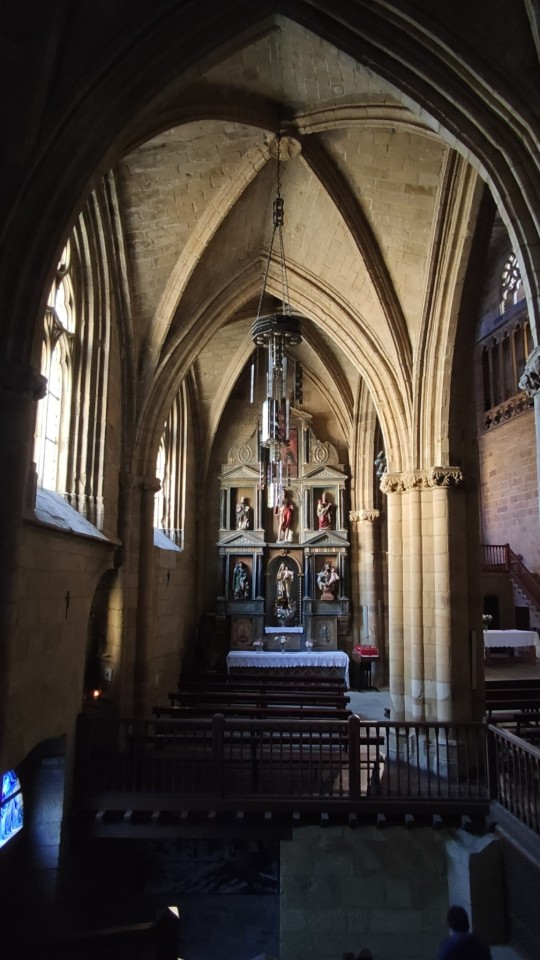
The Church of San Salvador, in Getaria (Guipúzcoa), is a Gothic-style building that has been declared a National Monument. It dates back to at least the 14th century, although most of it was built between the 16th and 18th centuries and had to undergo numerous repairs during the 19th century due to the damage it suffered in the Carlist Wars.
Antonio Íñigo 2026
37 notes
·
View notes
Text
history stopped in 1936

Javi G x F!Reader
Rating: Mature
Word Count: 2.6k
Warnings: Angst, Spanish Civil War AU, war and its horrors, brief and vague descriptions of sex, it's implied that Javi and reader are speaking Spanish the entire time, references to drinking and smoking, unbeta'd so please be gentle!
Summary: The Spanish Civil War threatens the slice of paradise you and Javi have found together. (AO3)
A/N: Hoo boy. This was written for @studioghibelli's writing challenge, and the moment I saw the moodboard, I knew I wanted to do something Atonement-inspired. You don't need to know who the opposing sides were in the war, but if you'd like to learn more, I'd recommend George Orwell's "Homage to Catalonia". The title comes from an essay of his. As always my love to @misscharlielulu for her support.
Mallorca, August 1936
Spain burns and, across the Balearic Sea, rumours are carried like ash on the wind.
You and Javier had fled Barcelona in the middle of the night, just after St Jordi’s Day. The streets had still been littered with rose petals as you had made your way to the docks, and the waiting ship. The atmosphere in Barcelona had grown tense, shimmering with electricity like the air just before a thunderstorm.
In July, your fears had been vindicated when news trickled across the sea, whispers of a violent uprising. Nobody could say for certain who had seized power – the anarchists, the communists, the Carlists, or some as-yet-unknown political spectre.
By contrast to the news reports that trickled over from the mainland, Mallorca felt safe. The ocean separating the island from the peninsula made the war feel further away, something that was happening in another world. Even when Barcelona fell or when, days later, Franco invaded with his African army in Seville - it all felt so far away, separated by miles of sparkling blue water.
On your island sanctuary, you and Javi managed to find a measure of happiness. Reminders of the war were never far away, and you were all probably smoking and drinking too much, but it didn’t matter. You could still watch movies on the projection reel he’d bought before he met you. Tucked up against Javi’s side, watching Clark Gable or Errol Flynn, you could forget the war on the mainland entirely.
It was only when the war came to Mallorca that you realised how deluded you had been.
With censored newspapers and downed radio communications, rumours run like wildfire across the island. Days after Seville falls, the stableboys hear that the Republicans have landed on the east coast – the housekeeper tells Marta that it’s Russians sent by Stalin, and the man who delivers the mail insists its Italians. There’s fighting in the streets of Palma and to the ports in the east, but nobody can agree on who exactly is fighting who.
You clean up after breakfast, a hastily made pa amb tomàquet that masks the staleness of the bread. Even for a family as rich as the Gutierrez’s, you cannot waste food anymore.
They say the fighting is in Palma, and Porto Cristo. Drawn onto a map, the Gutierrez villa would form the apex of the triangle; it’s about as far away from the fighting as you can get while still being on dry land. You try to breathe. It’s just another Tuesday morning. You’re breaking leftover breadcrusts into a bowl for the dogs when Javi appears.
“Leave that, my love. Come out into the garden with me?” He asks, wrapping a large hand around your wrist. You don’t need much convincing; you wipe your hands down on a towel and twine your fingers with your husband’s as you walk out across the patio to the greenery beyond.
The gardens are a riot of colour. In the hazy, golden light of summer, the colours seem almost over-saturated. It’s a world away from the dark, medieval splendour of Barcelona. Foxgloves and red poppies and bright marigolds fill the carefully planned beds around the pond, a riot of Technicolour hues that somehow work beautifully in concert.
In the sunlight, Javi’s curls look gilded; he glows, in spite of the anxiety furrowing his brow. A stone bench sits beneath a gazebo, and he leads you over there. The wooden structure is heavy with jasmine; the smell perfumes the air, blending with the salt of the nearby sea.
“Is something wrong, Javi? Is it Marta?” You ask, worry colouring your voice. Javi’s mother, Marta, was a complicated woman. She had loathed Lucas, her nephew by marriage, but had been unable to get out of bed for days when news had reached her that he had been taken into Montjuïc Castle as a prisoner. Even across the ocean, you had come to know that nobody came out of Montjuïc alive.
Javi shakes his head, his hand cupping your elbow as he guides you to sit down on the bench beside him. Even now, it’s unlike him to look so morose.
“I’ve been talking to my father.” This much you already knew. One of the stableboys had come to fetch Javi in the middle of breakfast: his father had requested his son ride out with him. Whatever they discussed, it’s knocked your husband’s relentless optimism, and that worries you more than anything.
You hold Javi’s hands and wait patiently for him to tell you what’s bothering him, but he seems unable to find the words. Your mind careers from calamity to disaster in his silence. Someone somewhere has issued a warrant for Javi’s arrest. The army is on the move and will reach the cliffs by nightfall. His father, Jordi, has had another heart attack.
“My father- that is, my father and I-” Javier starts. You squeeze his fingers, your heart beating a rapid tattoo in your rising panic.
“Please, Javi, just tell me,” you plead. He looks out over the cliffs and his shoulders slump resignedly.
“My father thinks you should leave.” A punch to the gut could not have winded you more. You sit there, blinking at him like an idiot, unable to understand what he just said.
“My father thinks you need to leave, and I do too.” He turns away from the ocean, cupping your face in his hand and forcing you to look into your eyes. “You need to leave Mallorca, leave Spain. Tonight if possible.”
“You want to send me away?” You manage, sounding rather more pathetic than you’d hoped. Javi shakes his head, his lovely brown eyes full of sorrow.
“I want you to be safe. And it’s not safe here, not for you.”
“It’s no more dangerous for me than-”
“It is more dangerous for you. The worst thing they do to men is shoot them.” The unspoken implication hangs unpleasantly in the air. Javi sighs and glances back towards the house. “My father thinks he can persuade my mother to leave.” You want to scream. You want to ask who made Jordi such an authority, who made him king of his own tiny dominion and gave him the power to dismiss you.
In your gut, you know Javier’s father is right. He’s been weathering the storms of Spanish politics since before you were born, a wily fox of a man who had declared months ago that the political powderkeg was about to explode.
“I won’t leave you,” you insist, your voice firmer now. Jordi might be right; an army will come here someday. But you’d rather face them than abandon your family. “Until death do us part, Javi.”
“Please, sweetheart. It would only be for a little while. The war can’t last forever.” He manages a smile; a soft, crooked grin that wants to make you give in. You’d do so much to make him smile again.
“Your father will never get Marta to leave. She won’t leave him, and you won’t leave them.” The half-smile falls from Javi’s face.
“They’re old, sweetheart. I need to take care of them. But you – you’re strong. I know you can do this. You’ll go somewhere safe, and as soon as we’ve weathered this storm, you’ll come back.�� Both of his hands are cupping your face now. Somewhere overhead, seagulls are screaming. His optimism makes you want to scream too.
“No, Javi, no, I can’t-” you start again, clutching his wrists in your hands.
“You can, you must,” he talks over you. In frustration you pull away, marching over the grass towards the house. One of Marta’s cats yowls at you as you pass it, pleading for attention, but you’re too upset to pay it any mind. Javi is hot on your heels, by turns pleading and stern. The door to your bedroom bangs against the wall as you fling it open.
You want space, but Javi won’t give it to you. He’s in your face, his hands roaming over you, clutching at your shoulders, your arms, your wrists. His rosy view of the world had been charming when you’d first met – now it makes you angry beyond words.
“I’m not leaving you,” you insist sharply, bringing your hands up to push your husband away from you. His hands circle your wrists instead, refusing to let you escape. “I’m not leaving you!” You repeat it in English, in your broken Catalan, in French. You tell him over and over in as many languages as you know, all the while struggling to break free of his hold.
The kiss takes you by surprise. He keeps one hand at your wrists; the other cups the back of your head. There’s no elegance to the kiss. He presses his mouth to yours, full lips meeting your own, your breath mingling with his. You’d almost think he’d done it deliberately to throw you off balance, if not for the surprised little intake of breath he makes.
“You are leaving tonight,” he says, once he’s broken the kiss. His fingertips grip the nape of your neck, your foreheads press together. You try to shake your head against his, but his hand at your neck grips tighter. “If I have to throw you into the boat myself, you’re leaving tonight.”
“I’ll hate you forever if you do.” It’s a childish assertion. His soft brown eyes fill with quiet devastation, and you immediately want to take it back.
“I’d rather have you hate me and survive than love me and die.” The two of you grapple again; him trying to keep his hold on you as you try to escape his grip. You have no real notion of why you want to break free – you could hardly hide in a cabinet until he gave up and allowed you to stay.
When the two of you tumble back onto the bed, it is an accident. You had tried to kick out with your legs, but had only succeeded in knocking you both off balance. His arms wrap around you as you lie on top of him, doing your best to squirm free and failing miserably.
You and Javi rarely argue. Any petty squabbles you do have are usually easily and quickly resolved. And when you do fight, you’ve gotten used to burning out that tension with sex.
So it feels like the most natural thing in the world to start pulling his shirtfront open. He takes your cue, his hands falling from your wrists and setting to work on the buttons of your dress. There’s a frantic energy to you both; for all you had been fighting him before, you can’t pull him close enough now. Your hands itch with the need to touch him, to memorise every inch and curve of him before he sends you away.
You sink your fingers into his curls and drag him down closer. It’s not making love, not the soft, slow sex that you and Javi usually have. This is something harsher, more demanding. The bedframe rattles with the force of your movements, and you know you should be embarrassed. The servants or Javi’s parents could hear, your actions unmistakable when the noise of the bed combines with the moans escaping from you both.
When you’ve both come, and are lying satiated in each other’s arms, the fire has gone out of your conversation. Javi rests his head on your breasts, humming contentedly as you play with his curls. You admire the Monet painting that faces the bed, the hazy floral landscape that you wish for all the world you and your husband could escape into. The canvas lilies almost seem to sway in the breeze with the haze of heat rising through the room.
“What if you forget me?” You say softly. As much as you know Javi loves you, you can’t deny that the thought scares you. That you will leave, but after long years of war, Javi will have moved on. He’ll find some pretty Mallorquin girl that never went into exile and never come to rescue you from your banishment.
“I could never forget you,” Javi says, tilting his head back to look at you. Those beautiful eyes of his are so full of sorrow that you want to cry yourself.
“You say that. What if this war lasts as long as the Great War? Longer?”
“It doesn’t matter. ‘If I had a flower for every time I thought of you, I could walk in my garden forever’,” he says in English.
“Byron?” You ask, and he shakes his head. Of course he would quote poetry at a time like this.
“Tennyson. It’s true. I could fill the whole island with flowers, all the thinking of you I shall do while we’re parted.” Javi’s hands rest on your thighs, his thumbs stroking lazy circles onto your skin.
“Wouldn’t that be something to behold. A whole island, full of flowers. You could live four lifetimes and never run out of scenery to paint.”
“I would write to you every day, you know,” Javier manages eventually. You know he would. Javi has always had an excellent turn of phrase – there were half-drafted screenplay ideas all over your apartment in Barcelona.
“And one letter in twenty might reach me,” you retort. The postal service hasn’t exactly been running efficiently of late, never mind the inevitable censorship everything seems to be going through.
“I would keep you here with me if there was any way I could be sure you’d be safe.” He says gently, and you sigh. “And I would like you to go willingly. But you’re going either way, I’m afraid.” Even issuing orders, there’s undeniable tenderness to it.
“Between the both of us, we might fill all of Europe with flowers.” You try to imagine it; two paths of flowers creeping across the continent, growing every time you and Javi think of one another.
“The whole world, even.” Javier clutches a little tighter at your thighs, and you can hear tears thickening his voice. You hold each other tighter, and you know now that neither of you will loosen your grip until the very last moment.
****
Later, there will be a forget-me-not pressed into your hand as you and Javi say your final goodbyes at the dock. Your clothes are weighted down by the money and jewellery sewn into the hems, but it’s the flower you treasure the most. You refuse to cry as you sail away; you stare insistently at the dock, long after Javier has faded from your sight. You know he’ll be doing the same, standing on the pier and keeping a watchful eye on the horizon until the sky starts to lighten with the dawn.
Later, in spite of your denials, there will be letters. Javi writes to you often, mostly of trivial, household matters that won’t be censored. In every one he tells you how the gardens are growing. In every one, there is a flower drawn into the margin. You hoard them like a dragon hoards gold; when your homesickness makes you feel physically ill, you surround yourself with his letters and tracing the lines of his pen.
Later, there will be a screenplay. It’s smuggled off the island and brought directly to you by a man who only speaks brusque Catalan, and you nearly weep just to hear the language spoken again. The screenplay bears a pseudonym – Javier Peña – but every line is clearly your Javi’s work. It tells of a great love story flourishing in the face of a brutal war, of love conquering all. You cry over the last twenty pages, a handkerchief clasped to your face so you don’t smudge the ink.
Later, the war will end. Spain will survive, though she will not be saved. You will never walk through a garden of flowers without thinking of Javi.
****
“But what really happened? The answer is simple: the lovers survive and flourish.” – Ian McEwan, Atonement
TAGLIST:
@avengersfan25 @misscharlielulu @apenny4thots @its-nebuleuse @totallynotastanacc
#studioghibelliswritingchallenge#javi g x reader#javi gutierrez x reader#javi g#javi gutierrez#the unbearable weight of massive talent
72 notes
·
View notes
Text

How is the speed of your Car Dealer website? Is it slow? Rebuild your Car Dealer website in just a few clicks. 🚗
🚗✨ Rev up your website with Motorx - Car Dealer & Listing WordPress Theme! 🌟
Introducing Motorx, the ultimate solution for car dealerships and listing websites. Whether you're selling luxury cars, vintage models, or the latest electric vehicles, Motorx has you covered.
Features: 🔥 Stunning and responsive design 🔥 Easy-to-use listing and inventory management 🔥 Vehicle comparison and review options 🔥 SEO optimized to attract more customers 🔥 Customizable to match your brand identity
Create a sleek, professional website that showcases your inventory and drives sales. With Motorx, you can provide an outstanding online experience for your customers.
Drive your business forward with Motorx today! 🚀
For the demo, visit here
#Motorx#CarDealer#WordPressTheme#CarListing#AutomotiveWebsite#ResponsiveDesign#SEO#VehicleSales#WebDesign#DealershipWebsite
1 note
·
View note
Text
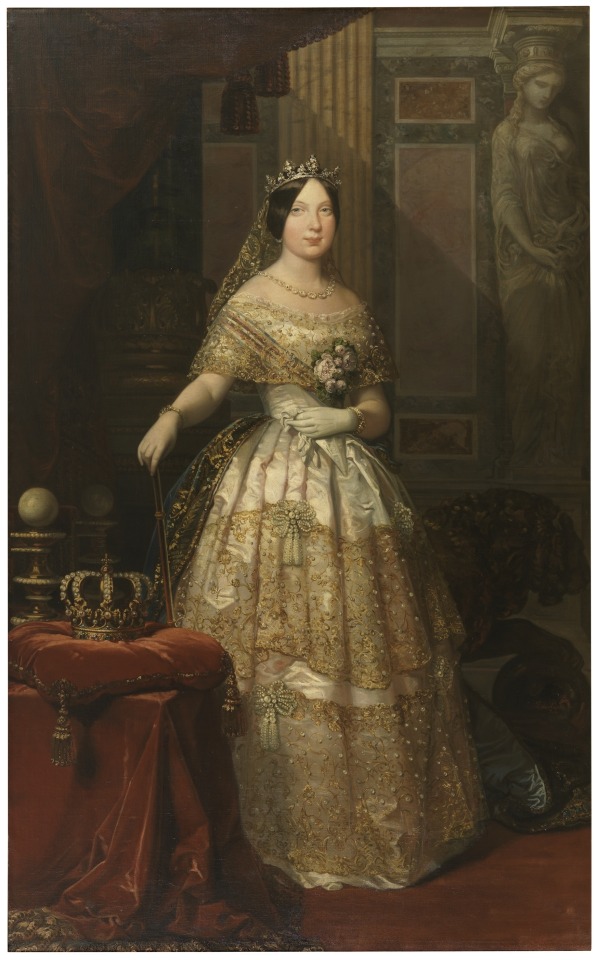
Isabella II
Artist: Federico de Madrazo y Kuntz (Spanish, 1815-1894)
Date: 1848
Medium: Oil on canvas
Collection: Museo Nacional del Prado, Madrid, Spain
Isabella II
Isabella II (Spanish: Isabel II, María Isabel Luisa de Borbón y Borbón-Dos Sicilias; 10 October 1830 – 9 April 1904) was Queen of Spain from 1833 until her deposition in 1868. She is the only queen regnant in the history of unified Spain.
Isabella was the elder daughter of King Ferdinand VII and Queen Maria Christina. Shortly before Isabella's birth, her father issued the Pragmatic Sanction to revert the Salic Law and ensure the succession of his firstborn daughter, due to his lack of a son. She came to the throne a month before her third birthday, but her succession was disputed by her uncle Infante Carlos (founder of the Carlist movement), whose refusal to recognize a female sovereign led to the Carlist Wars. Under the regency of her mother, Spain transitioned from an absolute monarchy to a constitutional monarchy, adopting the Royal Statute of 1834 and Constitution of 1837.
Isabella was declared of age and began her personal rule in 1843. Her effective reign was a period marked by palace intrigues, back-stairs and antechamber influences, barracks conspiracies, and military pronunciamientos. Her marriage to Francisco de Asís, Duke of Cádiz was an unhappy one, and her personal conduct as well as rumours of affairs damaged her reputation. In September 1868, a naval mutiny began in Cadiz, marking the beginning of the Glorious Revolution. The defeat of her forces by Marshal Francisco Serrano, 1st Duke of la Torre, brought her reign to an end, and she went into exile in France. In 1870, she formally abdicated the Spanish throne in favour of her son, Alfonso. In 1874, the First Spanish Republic was overthrown in a coup. The Bourbon monarchy was restored, and Alfonso ascended the throne as King Alfonso XII. Isabella returned to Spain two years later but soon again left for France, where she resided until her death in 1904.
#portrait#queen isabella ii#queen of spain#painting#full length#standing#interior#house of bourbon#spanish monarchy#spanish royal family#royal costume#gold lace#royal crown#lace veil#table#tiara#necklace#statue#jewelry#oil on canvas#fine art#oil painting#artwork#spanish queen#french culture#french art#federico de madrazo y kuntz#spanish painter#european art#19th century painting
24 notes
·
View notes
Text
"Louis I of Anjou’s death in Bari on September 21, 1384, escalated tensions in Provence. The threat that France would absorb the county loomed; Charles VI and Jean, duke of Berry, courted the dissidents while offering to help Louis’s widow, Marie of Blois, conquer Naples.
Marie, however, a shrewd and able regent, was determined to protect her son’s [Louis II of Anjou's] rights in the county as well as in Italy. She reacted strongly and swiftly, moving into Provence and taking aggressive action against the rebels. She also hastened to have her son swear fealty to Clement VII for Johanna’s lands, establishing him as the late queen’s heir and securing Clement’s support. A second meeting of the Estates assured Marie of the high nobility and won several new communes for Louis II, while it also negotiated a twenty months’ truce between Marie and the Union of Aix, which had no wish to see the county under French dominion.
During the truce negotiated with the Union of Aix, Marie pressed her advantage. Arles reunited with the crown in November 1385, Brignoles in May 1386, and Sisteron in June 1386, isolating the Union. Although Margaret of Durazzo attempted to keep Charles’s death in February 1386 a secret, the news made its way to Provence, leading more communes to negotiate with Marie in the spring of 1386. Marie continued her diplomatic efforts into the autumn of 1387, achieving a peace accord with most of the communes in June of that year. Aix finally capitulated on September 17. Pockets of resistance remained: Nice continued to hold out, and the remaining Carlist communities fell under the control of Savoy in 1388. Despite her losses, however, Marie had won back most of the county, establishing a base of power for Louis II. She was free to turn her attention to Naples, which became her primary concern from early 1388."
— Elizabeth Casteen, From She-Wolf to Martyr: The Reign and Disputed Reputation of Johanna I of Naples
#I love her can't you tell?#marie of blois#italian history#louis I of anjou#french history#14th century#historicwomendaily#my post
15 notes
·
View notes
Text
Dark!Rumbelle Fic Recs
Golden Cuffs by @kelyon. This is like... dark smut. Like BDSM and lots of psychological introspection on it. The sequel is set in Season 1 and pre-Season 1 Storybrooke and explores Gold and Lacey in such a setting. It's definitely got a dark romance sort of vibe.
Nothing is Innocent by @0ceanofdarkness. "The Dark One seeks his son in a land without magic, but he must obtain an elusive beast before the Dark Curse that will take him there can be cast."
Pride and Other Poisons by Hikari_no_Chibi. A Dark Victorian Rumbelle AU. "Gold is haunted by the First Carlist War, and Belle embodies everything he hates from his past. Expectations will crumble like the foundations of an old house, and it will be up to them to build something new on the rubble. Rated M for violence and substance abuse."
Shadow Manor by @suchadearie. "Mr. Gold sets out to find himself a wife that will bear him an heir for his estate. But his marriage to Belle French turns out to be a little more complicated than the mere business arrangement he had in mind."
Trading for Touch by @suchadearie. Set in cursed!SB, Belle enters into a "sordid" relationship of sorts with Mr Gold.
@suchadearie in general wrote a lot of fics where Belle and Gold have a sort of dark-ish dynamic.
In the Blood by Megara Bee. A vampire AU. "Belle French will never be able to settle her father's debts; of that she is certain. But she is hopeful that Mr. Gold, the most feared creature in Storybrooke, will accept her blood in trade. Unfortunately for her, he has something much more devious in mind…" Warning for sexual content that might not be everyone's cup of tea.
Endless by @mareyshelley. Vampire AU. "Unable to pass up the opportunity to attend one of Storybrooke’s annual balls, Belle finds herself drawn to the old manor’s library and her unusual host."
Honestly most of her fics have a dark vibe I really like, so I would recommend anything she's written.
The Haunted Man by @nerdrumple. "When her father tries to arrange a marriage for her, Belle decides to take fate into her own hands - but seeking the help of Mr. Gold is its own winding, mysterious path. Gothic Romance Rumbelle AU."
Will update this Rec List as I remember new fics. Hope it helps anon!
32 notes
·
View notes
Note
Could you explain what it is you like about Franco so much? The Spanish civil war and his reign was never treated as much more than a footnote in my history classes.
Introductory works I would recommend on the topic are Warren Carroll’s The Last Crusade and Peter Kemp’s Mine Were of Trouble
Francisco Franco was a flawed man who did more for the Church, single handedly, than almost any other individual in the 20th century. He saved Spain from some of the most insanely depraved people you could think of and exacted justice on those who were complicit in the murder of thousands of priests and the rape and murder of hundreds of nuns. He then instituted laws based on the laws of the Church and maintained correspondence with both Pius XI and Pius XII to ensure he was doing so properly.
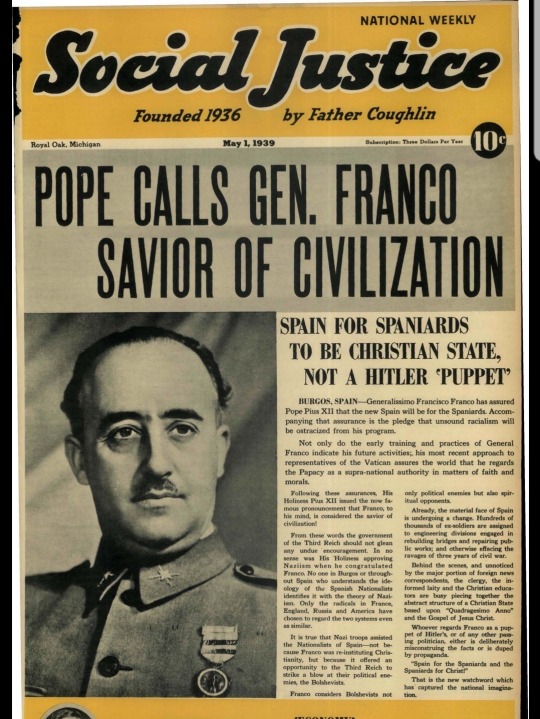
Here is a photo of him receiving the Collar of the Supreme Order of Christ, the highest honor a layman is able to receive, from the papal nuncio to Spain:
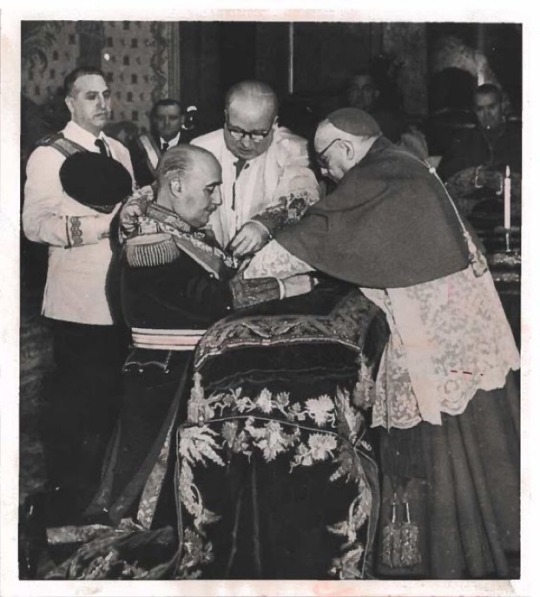
There is much to be critical of with Franco as there is with any man of history, even great ones. His imprudence with the treatment of the Carlists when forming the new government coalition after the war and his failure to provide a proper successor are a few of them. But both of those things had a lot of moving parts and issues that arose. All in all, though, anyone claiming he was a bad man is ignorant or has their moral compass in a twist.
18 notes
·
View notes